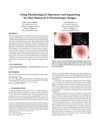 15 citations,
October 2017 in “Dermatologic Clinics”
15 citations,
October 2017 in “Dermatologic Clinics” New treatments for male hair loss show promise but need more research for safety and effectiveness.
 15 citations,
January 2017 in “Lasers in Surgery and Medicine”
15 citations,
January 2017 in “Lasers in Surgery and Medicine” Laser treatment improved scalp skin condition with no side effects.
 15 citations,
January 2015 in “Analytical Methods”
15 citations,
January 2015 in “Analytical Methods” Method accurately measures finasteride in tablets using finasteride-BSA interaction.
 14 citations,
April 2019 in “Saudi pharmaceutical journal”
14 citations,
April 2019 in “Saudi pharmaceutical journal” Microparticles help caffeic acid stay longer in hair follicles for better treatment of folliculitis.
 14 citations,
December 2011 in “Archives of Dermatological Research”
14 citations,
December 2011 in “Archives of Dermatological Research” Phyto-vesicles of β-sitosterol may effectively treat hair loss.
 14 citations,
April 2011 in “Journal of analytical & bioanalytical techniques”
14 citations,
April 2011 in “Journal of analytical & bioanalytical techniques” Created accurate method to measure tamsulosin hydrochloride and finasteride in tablets.
 13 citations,
January 2020 in “Nanoscale”
13 citations,
January 2020 in “Nanoscale” Finasteride and baicalin in phospholipid vesicles effectively promote hair growth and increase follicle count.
 13 citations,
April 2016 in “Journal of Dermatology”
13 citations,
April 2016 in “Journal of Dermatology” 308-nm excimer light therapy helped over a third of treatment-resistant alopecia universalis patients regrow most of their hair.
 13 citations,
December 2013 in “Chemistry Central Journal”
13 citations,
December 2013 in “Chemistry Central Journal” Sunlight exposure increases drug toxicity; amber glass best for protection.
 13 citations,
January 2012 in “Case reports in dermatological medicine”
13 citations,
January 2012 in “Case reports in dermatological medicine” An 84-year-old man got a rare scalp condition from using imiquimod cream, which was cured with systemic steroids.
 13 citations,
January 1995 in “Journal of the American Institute for Conservation”
13 citations,
January 1995 in “Journal of the American Institute for Conservation” Researchers developed a less damaging way to extract red dyes from wool using EDTA and DMF, preserving the fiber's strength for further analysis.
 12 citations,
June 2019 in “Clinics in dermatology”
12 citations,
June 2019 in “Clinics in dermatology” PRP shows promise for skin rejuvenation but needs more research.
 12 citations,
January 2011 in “Dermatologic Surgery”
12 citations,
January 2011 in “Dermatologic Surgery” Retinoids can prevent skin cancer in high-risk people but have side effects and require more research on dosing and effectiveness.
 12 citations,
January 2005 in “Journal of Cosmetic Dermatology”
12 citations,
January 2005 in “Journal of Cosmetic Dermatology” AGA affects many, progresses differently, and early treatment is crucial.
 11 citations,
September 2020 in “Journal of Cosmetic Dermatology”
11 citations,
September 2020 in “Journal of Cosmetic Dermatology” Silver nanoparticles can significantly promote hair growth.
 11 citations,
February 2018 in “Archives of Pharmacal Research”
11 citations,
February 2018 in “Archives of Pharmacal Research” Finasteride reduces melanin production, possibly treating hyperpigmentation and melanoma, but needs more safety research.

The new algorithm removes hair from skin images better than previous methods, helping diagnose melanoma.
 11 citations,
June 2013 in “Journal of Chemical Education”
11 citations,
June 2013 in “Journal of Chemical Education” Minoxidil detects nitrite in water, creating a simple, cheap test.
 11 citations,
January 2006 in “International Journal of Cosmetic Science”
11 citations,
January 2006 in “International Journal of Cosmetic Science” Some oils can penetrate hair and reduce the stickiness between fibers, but mineral oil cannot.
 10 citations,
May 2015 in “International Journal of Women's Dermatology”
10 citations,
May 2015 in “International Journal of Women's Dermatology” New treatments for skin and hair disorders in women of color address unique biological differences and include specific acne medications, sunscreens, skin lighteners, and hair care adjustments.
 10 citations,
August 2012 in “Clinical Pharmacokinectics”
10 citations,
August 2012 in “Clinical Pharmacokinectics” Type 2 diabetes does not change how metformin works in obese pregnant women, so dosage adjustments are not needed.
 10 citations,
January 1985 in “Elsevier eBooks”
10 citations,
January 1985 in “Elsevier eBooks” Active oxygen species might be involved in skin tumor growth, but their exact role is unclear.
 9 citations,
November 2019 in “Scientific reports”
9 citations,
November 2019 in “Scientific reports” The AC 2 peptide from Trapa japonica fruit helps protect hair cells and may treat hair loss.
 9 citations,
August 2019 in “Journal of The European Academy of Dermatology and Venereology”
9 citations,
August 2019 in “Journal of The European Academy of Dermatology and Venereology” Minoxidil activation by hair enzymes predicts treatment success for female hair loss.
 9 citations,
July 2018 in “Current Pharmaceutical Design”
9 citations,
July 2018 in “Current Pharmaceutical Design” HO-1 helps skin health and healing but can worsen melanoma; it's a potential treatment target for skin diseases.
 9 citations,
August 2017 in “Photochemistry and Photobiology”
9 citations,
August 2017 in “Photochemistry and Photobiology” Red light at 627 nm can safely trigger IL-4 release in skin cells, potentially helping treat inflammatory skin conditions.
 9 citations,
February 2011 in “Revista Brasileira de Farmacognosia”
9 citations,
February 2011 in “Revista Brasileira de Farmacognosia” Tridax procumbens plant parts boost immune response in mice.
 9 citations,
January 1999 in “Journal of Liquid Chromatography & Related Technologies”
9 citations,
January 1999 in “Journal of Liquid Chromatography & Related Technologies” Best results found using acetonitrile, water, and trifluoroacetic acid or methanol mixture.
 8 citations,
October 2015 in “Asian Journal of Chemistry”
8 citations,
October 2015 in “Asian Journal of Chemistry” A new method was created to accurately measure minoxidil and aminexil in hair loss treatments.
 8 citations,
January 2013 in “Medicinal chemistry”
8 citations,
January 2013 in “Medicinal chemistry” The compound 4c showed strong potential as an anticancer agent.






























